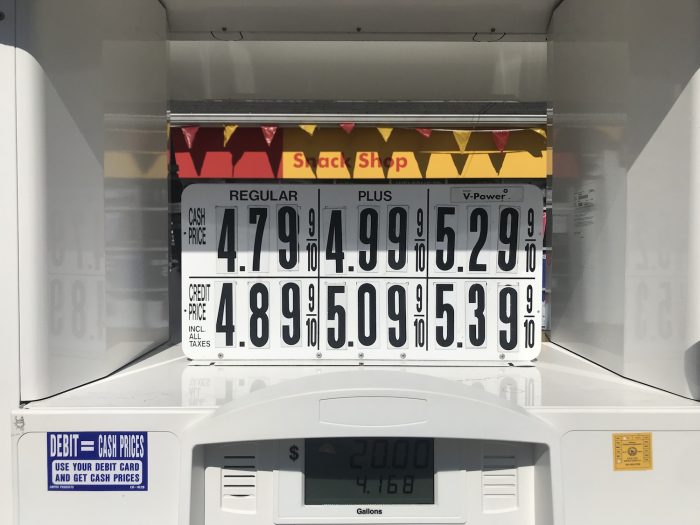Pain at the pump: Gas crisis affects all Long Islanders
Consumers are not the only ones feeling the pinch of ballooning gas prices here on Long Island.
Kevin Beyer is vice president of government affairs at the Long Island Gasoline Retailers Association, a nonprofit trade association which represents over 700 independent service stations throughout Suffolk, Nassau and Queens. According to Beyer, gas retailers are suffering as well.
“When it hurts you as a consumer, it hurts us,” Beyer said in a phone interview. “People think that when prices go up, these gas stations are making a killing. It’s quite the opposite because we’re constantly trying to keep the price down. When we start making money is usually when [the price of gas] levels out or it goes down.”
Beyer also notes that the cost of diesel fuel has increased exponentially. This affects a wide range of consumers, particularly commercial and pickup truck drivers.
“There are a lot of consumers that use diesel because a lot of people have bought pickup trucks in the last few years,” he said.
Despite recent calls for electric vehicles, Beyer believes that the wholesale transition to electric cars is not feasible due to difficulties related to the technology and is counterintuitive due to already high utility rates in New York.
“You have to deal with massive batteries that have to be produced,” Beyer said. “To produce the batteries, you’re buying products from other countries, number one. Number two, to discard these batteries, you’re talking about a hazard. Number three, there aren’t a lot of charging stations, and New York and California already have probably the highest utility rates in the country.”
Beyer believes that as gas prices continue to rise, governments that tax oil will have a windfall profit. This is why he said LIGRA is lobbying to remove gas taxes at the county and state levels.
“One thing that we are working on is to try to push for some tax relief, even on the county and state levels,” he said. “People don’t realize that they’re making a fortune — the county and the state — as the cost goes up because it’s a percentage per gallon.”
Soaring gas prices will also disrupt local businesses on Long Island, according to Martin Cantor, director of the Long Island Center for Socio-Economic Policy and author of “Long Island, the Global Economy and Race.”Other than the railroad which carries the commuters, Long Island is not a mass transit-friendly community.
— Martin Cantor
According to Cantor, Long Island was originally envisioned as a bedroom community for New York City residents. To continue their existing way of life, commuters who drive to work have no choice but to pay up.
“The reality is that Long Island has a workforce of about 1.4 million people with, at its peak, 300,000 Long Islanders commuting daily on the Long Island Rail Road,” he said. “With the LIRR operating at 48% of pre-pandemic capacity, some of the workforce has no option but to fill up at the high prices.”
According to Cantor, Long Island’s transportation networks were not designed to support the commuter economy of today. He said antiquated public transit systems have led to increased reliance on automobiles.
“Other than the railroad which carries the commuters, Long Island is not a mass transit-friendly community,” he said. “We just don’t have enough public transportation to carry Long Islanders around. We are wedded to our cars and will continue to be.”
Cantor said that the exorbitant cost of gas will leave residents with less discretionary income, which in turn will harm local businesses.
“Just think, a year ago [gas] was pretty much half the price,” he said. “Right now, with gasoline prices so high, as people have to go to work and have to commute to work, more people are putting gasoline in their cars at higher prices and have less money to spend in the surrounding communities.”
Cantor believes that not only drivers will suffer due to the cost of gas, but that local business owners will take a major hit as well.
“Some of the workforce has no option but to fill up at the high prices,” he said. “That will hurt the economy because the money we spend for gasoline really gets exported off the Island. Those additional dollars we spend for gasoline will take money out of Long Islanders’ pockets to spend. That’s going to hurt the small businesses that already are hurting from the pandemic.”
To read about Cantor’s work, visit martincantor.com.







